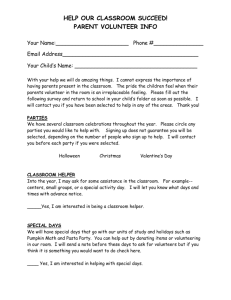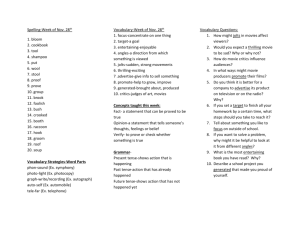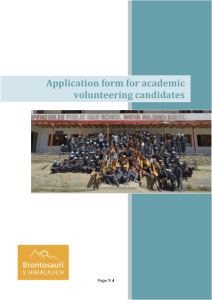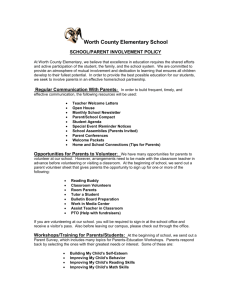introduction to american politics
advertisement
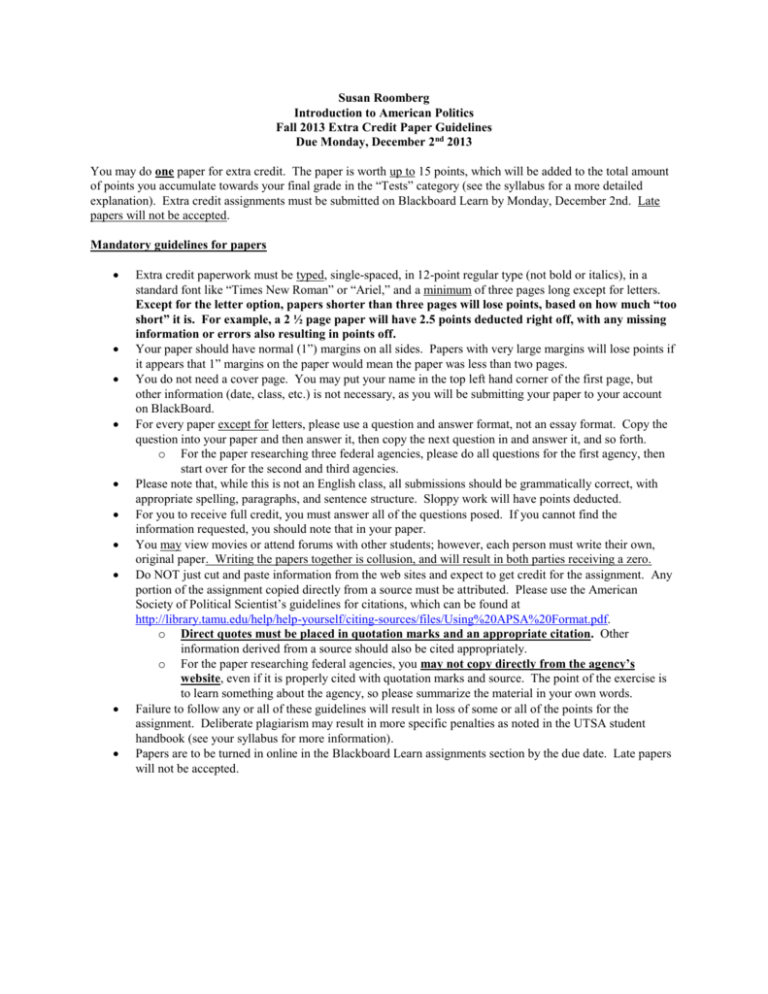
Susan Roomberg Introduction to American Politics Fall 2013 Extra Credit Paper Guidelines Due Monday, December 2nd 2013 You may do one paper for extra credit. The paper is worth up to 15 points, which will be added to the total amount of points you accumulate towards your final grade in the “Tests” category (see the syllabus for a more detailed explanation). Extra credit assignments must be submitted on Blackboard Learn by Monday, December 2nd. Late papers will not be accepted. Mandatory guidelines for papers Extra credit paperwork must be typed, single-spaced, in 12-point regular type (not bold or italics), in a standard font like “Times New Roman” or “Ariel,” and a minimum of three pages long except for letters. Except for the letter option, papers shorter than three pages will lose points, based on how much “too short” it is. For example, a 2 ½ page paper will have 2.5 points deducted right off, with any missing information or errors also resulting in points off. Your paper should have normal (1”) margins on all sides. Papers with very large margins will lose points if it appears that 1” margins on the paper would mean the paper was less than two pages. You do not need a cover page. You may put your name in the top left hand corner of the first page, but other information (date, class, etc.) is not necessary, as you will be submitting your paper to your account on BlackBoard. For every paper except for letters, please use a question and answer format, not an essay format. Copy the question into your paper and then answer it, then copy the next question in and answer it, and so forth. o For the paper researching three federal agencies, please do all questions for the first agency, then start over for the second and third agencies. Please note that, while this is not an English class, all submissions should be grammatically correct, with appropriate spelling, paragraphs, and sentence structure. Sloppy work will have points deducted. For you to receive full credit, you must answer all of the questions posed. If you cannot find the information requested, you should note that in your paper. You may view movies or attend forums with other students; however, each person must write their own, original paper. Writing the papers together is collusion, and will result in both parties receiving a zero. Do NOT just cut and paste information from the web sites and expect to get credit for the assignment. Any portion of the assignment copied directly from a source must be attributed. Please use the American Society of Political Scientist’s guidelines for citations, which can be found at http://library.tamu.edu/help/help-yourself/citing-sources/files/Using%20APSA%20Format.pdf. o Direct quotes must be placed in quotation marks and an appropriate citation. Other information derived from a source should also be cited appropriately. o For the paper researching federal agencies, you may not copy directly from the agency’s website, even if it is properly cited with quotation marks and source. The point of the exercise is to learn something about the agency, so please summarize the material in your own words. Failure to follow any or all of these guidelines will result in loss of some or all of the points for the assignment. Deliberate plagiarism may result in more specific penalties as noted in the UTSA student handbook (see your syllabus for more information). Papers are to be turned in online in the Blackboard Learn assignments section by the due date. Late papers will not be accepted. Extra Credit Topics 1. Internet Research on Federal Agencies. Use the Internet to gather information about each (yes, you must do ALL THREE for full credit) of the following federal agencies: the Department of Defense (http://www.defense.gov/); the Department of State (http://www.state.gov/) and the Department of the Interior (http://www.doi.gov/). Answer the following questions for each web site: (1) what basic information about the department or agency does the site include? At a minimum, please provide the agency name and web address, a general description of what the agency does (mission statement will do), the address, e-mail address, and telephone number for the main office in Washington, D.C., and the name of the agency’s head (Cabinet Secretary); (2) Describe (at least 3 sentences for each) five of the main services provide by this agency; (3) Describe three issues currently being addressed by the department or agency (3 sentences long for each issue); and (4)What is the most interesting thing you found out about the agency? Why? (5) Find one service the agency provides that you personally can use and describe it to me For ALL questions, do NOT just copy what is said on the website. Doing a “cut and paste” without attribution is plagiarism and will result in a zero on your paper. 2. Attend a meeting or forum about a political or governmental topic. I will post notices for suitable forums on Blackboard; you may email me to ask about events not posted. Your paper should answer the following questions: (1) What organization(s) sponsored the meeting and who were the featured speakers? (2) About how many people attended the meeting? Describe the audience demographics. (3) What was the main topic of the meeting? (4) Why did you choose this meeting, and what did you know about the topic before you attended? (5) Describe in detail the four most interesting things you learned from the meeting. (6) What conclusions you have you come to regarding the topic, if any? (7) If you had an opinion about the subject before the meeting, have you changed your mind? Why or why not? 3. Interview a federal employee. Find someone who works for a federal agency and interview them. Remember, your paper must be three pages long, so make sure the answers to each question are very detailed. If necessary, ask follow-up questions to ensure you have enough material. Answer the following questions: 1) For which agency do you work? How long have you worked there? Have you ever worked for any other federal, state, or local agencies, and if so, where and what did you do? (2) What is your job title and what kinds of things do you do in an average day? (3a) What is the most interesting thing you have ever been required to do for your job? (3b)What do you dislike the most about your job (or what is the worst or most boring thing you ever had to do for your job? (4a) In general, do you enjoy your job? Why or why not? (4b) Is there another federal job you think would be interesting to do? What does it involve? (5) What qualifications are required for applicants to a job like yours? (6) Would you recommend a career with the federal government to a college student? Why or why not? (7) What are the advantages and disadvantages of working for the federal government as opposed to the private sector? If you don’t personally know someone who works for the federal government, you can call a local office. There are many federal agencies that have branch offices in the area. You must interview the person either on the phone or in person; do not interview via email. http://www.google.com/search?q=san+antonio+federal+offices&ie=utf-8&oe=utf8&aq=t&rls=org.mozilla:en-US:official&client=firefox-a 4. Write to an elected or appointed official or newspaper editor. Write a letter to a newspaper editor or an appointed or elected official (the President, Vice President, a representative or senator, or a federal agency or department head) about an issue of concern to you. You should (1) discuss the topic at length, stating your concern, (2) ask for a specific action (please vote for HR 1234) and (3) give at least three arguments to support your request, showing why you believe this action is the best solution. Each argument should be presented in a separate paragraph with supporting data. This requirement means you will need to do research on your topic and find reliable data to support your argument. Please include your reference in the body of your letter, either by including it in a sentence (As John Doe reported May 17 th in the New York Times in his article, “What Was I Thinking?”) or by citing it in your letter in parenthesis (John Doe, “What Was I Thinking?”, New York Times, May 17th 2013.) The letter must be at least one and one-half typed, single spaced page long. The letter should be mailed. In addition to the letter, you must submit to me a scanned copy of the stamped envelope you used to mail the letter. If you do not have a scanner, the university’s campus computer labs can assist you. I WILL NOT accept a stamped envelope in lieu of the scanned copy. Papers without a scanned copy of the envelope will lose points. You will NOT be graded on your point of view, only whether or not your argument is presented effectively in your letter. I will post information on Blackboard Learn with guidelines for writing to elected officials. 5. Watch a Movie. Watch a movie related to a topic discussed in this course. Then answer the following questions: (1) What is the title of the film and when was it released? (2) What is the movie about? Summarize the story in your own words. (The summary should be no more than one paragraph; the rest of the paper should be your analysis). (3) Describe at least three specific events shown in the movie that relate to topics covered in class and analyze how accurately you believe they portray reality (relative to the U.S. government and how it functions). You may need to read ahead in your text for this portion of the assignment. (4) What point of view does the movie appear to have about government (i.e. positive, negative, or in-between)? Provide examples of incidents in the film you believe support your belief. (5) Do you agree or disagree with the political views in the film? Why or why not? (6) What was the most interesting part of the movie for you, and why? Acceptable choices include: Frost/Nixon, Milk, Zero Dark Thirty, Lincoln, Mr. Smith Goes to Washington, Gideon’s Trumpet, The War Room, Primary Colors (1998 with John Travolta), The Candidate, Bob Roberts, All the President’s Men, Malcom X, Erin Brockovich, Advise and Consent, JFK, Nixon, Norma Rae, Journeys with George, All the King’s Men (old or new), Seven Days in May, The Manchurian Candidate (old or new), Absence of Malice, Supersize Me, All the King’s Men, Apocalypse Now, Avatar, Charlie Wilson’s War, An Inconvenient Truth, Dr. Strangelove, Fahrenheit 451, Goodnight and Good Luck, JFK, Man of the Year, Mississippi Burning, Network, Bowling for Columbine, Philadelphia, Platoon, Band of Brothers, Dave, Hoffa, Fahrenheit 9/11,Thank You for Smoking, Casino Jack and the United States of Money, Hot Coffee, Food, Inc., Inside Job, Wag the Dog, 1984, The Help, Apocalypse Now, The Great Debaters, The Most Dangerous Man in America, and Vote for Me. Other movies out may also be acceptable; please see me if you wish to view a movie not found in this list. Some of these movies may be found at UTSA’s library. All movies should be those generally released to the public, not a video found only on the internet. 6. Volunteer with a local nonprofit or government agency. To receive credit for this activity, you must volunteer for at least two hours. The paper should address: (1) For which nonprofit or agency did you volunteer? Why did you choose it? What does the organization do? (2) What did you do for your volunteer work? Was it enjoyable? Why or why not? (3) What type of client does the agency or nonprofit serve? (4) For one of your answers, please put whether or not the nonprofit receives any government funding (please get the name of the grant(s)). (5) How does what you did relate to at least three of the topics covered in class (this may include either topics in the textbook or things discussed during the current events portion of class, and you should describe each of the three topics with at least three sentences each)? You may have to read ahead in your book to answer this question. (6) What did you learn during your volunteer experience? Would you volunteer with this agency again, or would you choose another agency? Why or why not? (7) Please list your supervisor’s name, title with the organization, and phone number. Guidelines for volunteer time eligible for extra credit: Volunteering at a non-profit organization (such as the Ronald McDonald House or Fischer House) or a one-day event sponsored by a non-profit (such as the Basura Bash on Feb. 23rd.). Volunteering for a political campaign (City Council elections are in May) Community organizing, including voter registration Time spent volunteering in a religious institution is not eligible unless it does not include teaching or promoting one faith (for example, you can get credit for serving food or other activities at a faith-based organization that does not include a formal sermon, but not for teaching Sunday School) Time spent volunteering for a for-profit organization is not eligible If you have questions or would like suggestions, please email me Look for opportunities at these links: 1. http://www.utsa.edu/ice/vs/ 2. http://www.associatedcontent.com/article/783701/volunteer_opportunities_in_san_an tonio.html 3. http://www.volunteermatch.org/search/index.jsp?r=20.0&l=San+Antonio%2C+TX+7 8249%2C+USA&o=distance 5. I will post several editorials (opinion pieces) on BB Learn in the Extra Credit folder (look for a folder that says “EC Question 5”). Read three of the editorials and then answer the following questions for each. Your answers to each question should be a MINIMUM of three sentences each. Answer all of the questions for one article, and then start on the next. (1) Which article are you writing about? What is the main topic of the article (not the writer’s opinion, but what topic or topics the opinion is about)? (2) What is the writer’s opinion about the topic or topics presented? (3) Is this topic something you knew anything about prior to reading the article? Is the topic interesting to you? Why or why not? (4) After reading the article, what is your opinion about the topic? If you agree with the author, why? If you disagree, why? (5) What was your opinion about the issue prior to reading the article? Did the article change your opinion? Why or why not?


